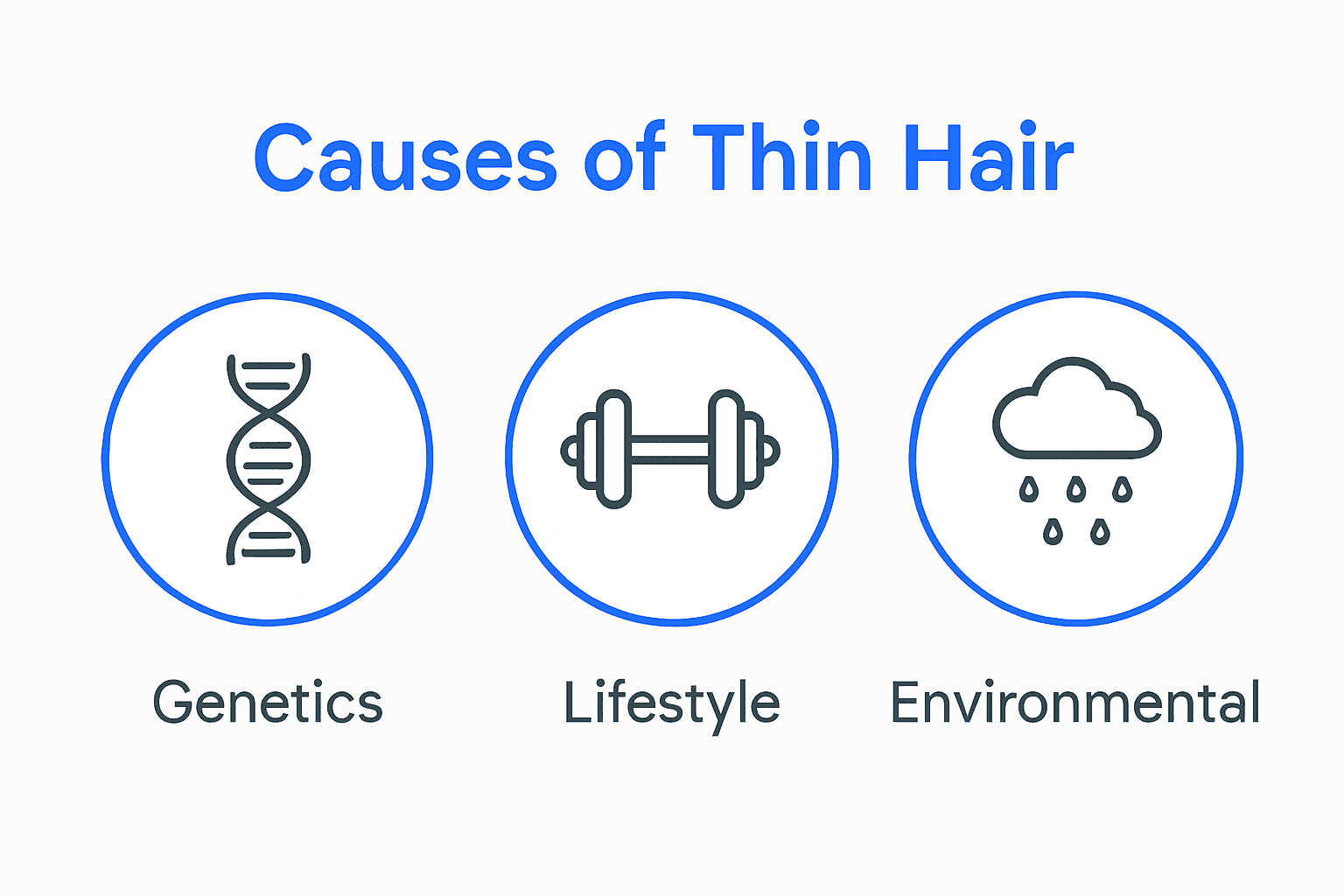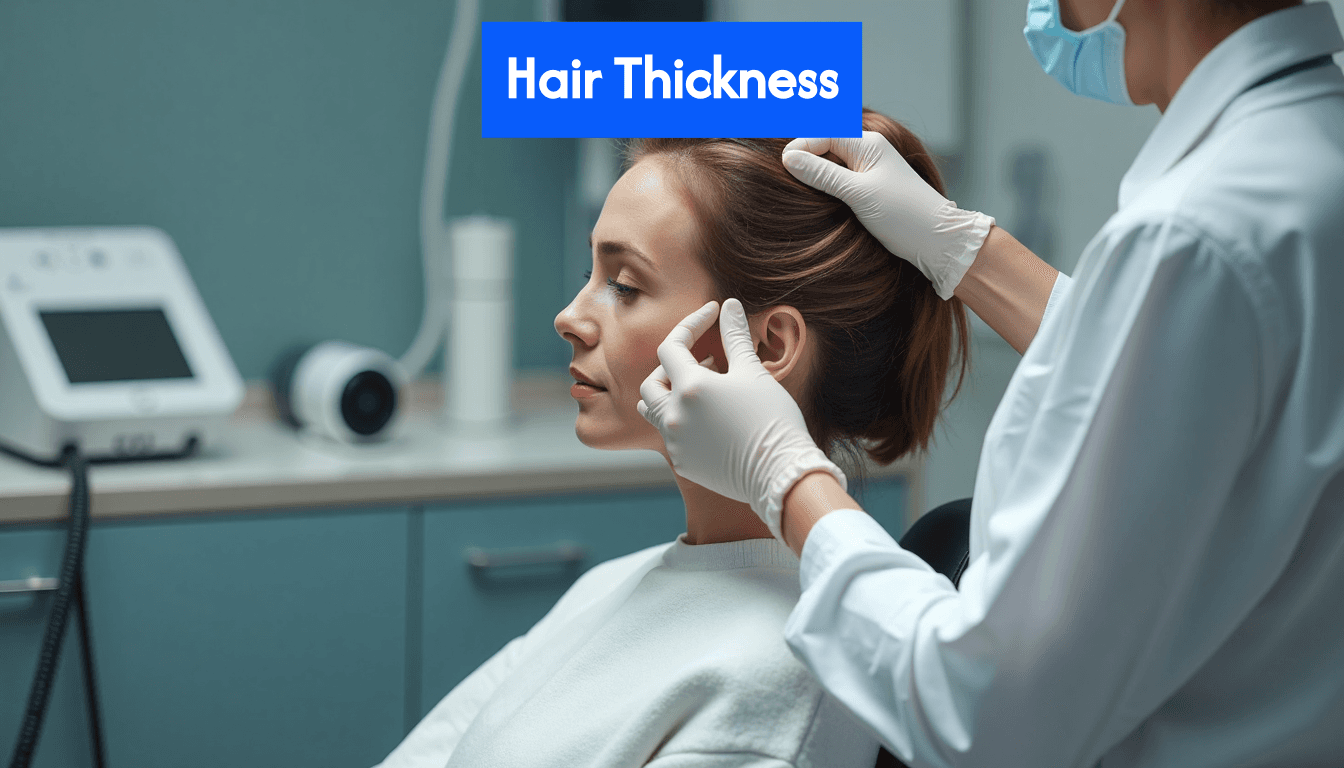Blog
Learning Materials
Thin Hair Thick: Expert Solutions and Growth Tips for 2025
Updated: June 6, 2025

Thin hair frustrates millions, yet it is not always just a matter of aging or bad luck. Over 85 percent of men and 33 percent of women experience genetic hair thinning in their lives. Surprised? Here's the unexpected part. Instead of accepting it as inevitable, new advances in nutrition, tracking tools, and AI-powered personalization are making it possible to outsmart your DNA and build a fuller head of hair. What you do starting now could have a bigger impact than your genes ever will.
Table of Contents
- Understanding The Causes Of Thin Hair
- Proven Ways To Make Thin Hair Thick
- Tracking Hair Growth For Better Results
- Personalized Hair Care And Brand Solutions
Quick Summary
| Takeaway | Explanation |
|---|---|
| Genetic Factors Influence Hair Thickness | Genetic predisposition, particularly androgenetic alopecia, significantly impacts hair thickness and loss, affecting about 85% of men and 33% of women. Understanding one's genetic background can aid in proactive management of hair thinning. |
| Nutrition is Key for Hair Health | Adequate protein intake and essential vitamins and minerals like zinc, iron, and biotin are crucial for supporting hair thickness and preventing breakage. Daily collagen supplements have also shown positive effects on hair health. |
| Modern Tracking Tools Enhance Hair Growth Management | Advanced digital technologies and applications allow for precise tracking of hair growth metrics, enabling individuals to receive personalized recommendations based on follicle density and growth rates. |
| AI-Driven Personalization in Hair Care | Tailored hair care solutions leveraging AI can provide individualized treatment regimens, incorporating factors such as genetics, hormonal profiles, and scalp health for optimal results in hair thickness and overall coverage. |
| Holistic Approaches Yield Comprehensive Solutions | A thorough assessment that considers lifestyle, nutrition, and environmental factors can enhance hair care strategies, moving beyond basic treatments to address the complete health of hair. |
Understanding the Causes of Thin Hair
Thin hair represents a complex challenge affecting millions worldwide, with multiple interconnected factors contributing to its development. Understanding these root causes is crucial for developing effective strategies to address hair thinning and promote healthier hair growth.

Genetic Predisposition: The DNA Factor
Genetic inheritance plays a significant role in hair thickness and potential loss. Androgenetic alopecia, commonly known as hereditary pattern baldness, impacts an astounding 85% of men and 33% of women during their lifetime. This genetic condition causes hair follicles to become progressively smaller, resulting in thinner, shorter hair strands.
The genetic blueprint determines how sensitive your hair follicles are to hormonal changes, particularly dihydrotestosterone (DHT). Some individuals inherit genes that make their hair follicles more susceptible to shrinkage, leading to a gradual reduction in hair density. Genetic testing can now help predict potential hair thinning patterns, allowing for proactive management strategies.
Lifestyle and Environmental Stressors
Modern lifestyle factors significantly contribute to hair thinning beyond genetic predisposition. Research indicates that environmental and lifestyle elements can accelerate hair loss more rapidly than previously understood.
Chronic stress emerges as a critical factor in hair health. Scientific studies demonstrate that elevated cortisol levels disrupt the natural hair growth cycle. When stress persists, more hair follicles enter the shedding phase simultaneously, a condition known as telogen effluvium. This phenomenon can result in noticeable thinning and reduced hair volume.
Additional lifestyle factors contributing to thin hair include:
- Nutritional Deficiencies: Lack of essential proteins, vitamins, and minerals can weaken hair structure
- Environmental Pollution: Exposure to toxins can damage hair follicles and impede healthy growth
- Improper Hair Care: Aggressive styling, excessive heat treatment, and harsh chemical processes
Hormonal and Medical Influences
Hormonal fluctuations represent another critical dimension in understanding thin hair. Conditions such as thyroid disorders, hormonal imbalances during pregnancy, menopause, and certain medical treatments can dramatically impact hair thickness. Medications for conditions like depression, blood pressure, and cancer often list hair thinning as a potential side effect.
Understanding these multifaceted causes empowers individuals to take targeted approaches in managing and potentially reversing hair thinning. While some factors remain beyond personal control, proactive strategies in nutrition, stress management, and personalized hair care can significantly mitigate the progression of thin hair.
By recognizing the intricate interplay of genetic, environmental, and physiological factors, you can develop a comprehensive strategy to maintain and potentially improve your hair's thickness and overall health.
Proven Ways to Make Thin Hair Thick
Transforming thin hair into a thicker, fuller appearance requires a strategic approach combining advanced treatments, targeted nutrition, and specialized hair care techniques. Understanding the most effective methods can help individuals successfully combat hair thinning and promote robust hair growth.
Advanced Clinical Treatments
Modern hair restoration techniques have revolutionized our ability to address thin hair. Platelet-Rich Plasma (PRP) therapy stands at the forefront of non-surgical hair restoration. This innovative treatment uses concentrated platelets extracted from the patient's own blood to stimulate hair follicles, encouraging growth and improving hair thickness through precisely calibrated growth factor concentrations.
Another promising treatment is the Bio-Pilixin Serum, a drug-free plant-based solution that has demonstrated remarkable results. Clinical studies show the serum can reduce hair shedding and boost density, with noticeable improvements appearing in as little as 6 weeks and full results developing over 5 months.

Nutritional Strategies for Hair Thickness
Nutrition plays a critical role in hair health and thickness. Recent research from 2023 revealed that daily collagen supplements taken over a six-month period significantly improved hair thickness and reduced breakage in participants experiencing thinning hair.
Key nutritional approaches to support hair thickness include:
- Protein Intake: Consuming adequate protein provides essential amino acids for keratin production
- Mineral Supplementation: Zinc, iron, and selenium support healthy hair follicle function
- Vitamin Complex: Biotin, vitamin D, and vitamin E contribute to hair strength and growth
Specialized Hair Care Techniques
Effective hair care goes beyond simple washing and conditioning. Implementing targeted techniques can help create the appearance of thicker hair and support actual hair health. Strategies include using volumizing shampoos with lightweight formulas, practicing gentle scalp massage to stimulate blood circulation, and avoiding heat styling that can cause additional damage.
Microfiber towels and silk pillowcases can reduce friction and prevent hair breakage, while strategic haircuts with layered techniques can create the illusion of fuller hair. Professional treatments like scalp micropigmentation and specialized hair thickening products can also provide immediate visual improvements.
By combining clinical treatments, nutritional support, and intelligent hair care techniques, individuals can develop a comprehensive approach to transforming thin hair. The key lies in patience, consistency, and a holistic understanding of hair health that addresses both internal and external factors contributing to hair thickness.
Tracking Hair Growth for Better Results
Modern approaches to understanding and managing hair growth have transformed from passive observation to active, data-driven tracking. Sophisticated technologies now enable individuals to gain unprecedented insights into their hair health, allowing for more personalized and effective interventions.
Scientific Advances in Hair Growth Monitoring
Researchers at the University of Virginia have uncovered groundbreaking insights into hair growth mechanisms by identifying a previously unknown stem cell population in the hair follicle. This discovery reveals complex cellular interactions that play a crucial role in hair regeneration and growth patterns.
Scientific studies using genetically marked cells have demonstrated remarkable tracking capabilities. By monitoring the movement and behavior of mid-follicle stem cells during the hair growth cycle, researchers can now trace how these cells actively repopulate different regions of the follicle. This precision tracking offers unprecedented understanding of hair growth dynamics.
Technological Tools for Personal Hair Tracking
Digital technologies have revolutionized personal hair growth monitoring. Advanced smartphone applications and specialized scanning devices now provide individuals with comprehensive hair health assessments. These tools typically offer features like:
- Follicle Density Mapping: Precise tracking of hair density over time
- Growth Rate Calculations: Measuring millimeter-level hair growth
- Scalp Health Analysis: Detecting early signs of potential hair loss
Interpreting Growth Data for Personalized Strategies
Successful hair growth management requires more than just collecting data. Interpreting the information requires understanding individual variability and recognizing subtle changes in hair health. Factors such as seasonal variations, hormonal fluctuations, and lifestyle changes can significantly impact hair growth patterns.
Professional hair specialists now use advanced algorithms to translate raw tracking data into actionable insights. These personalized recommendations might include targeted nutritional supplements, specific hair care routines, or medical interventions based on an individual's unique hair growth profile.
By embracing these scientific and technological advances, individuals can move beyond generic hair care approaches. The ability to track hair growth with unprecedented precision empowers people to take proactive, informed steps toward maintaining and improving their hair health. The future of hair growth management lies in this intersection of personal tracking, scientific understanding, and customized interventions.
Personalized Hair Care and Brand Solutions
The landscape of hair care is undergoing a revolutionary transformation, driven by advanced technologies that offer unprecedented personalization. Gone are the days of generic hair treatments solutions now adapt precisely to individual hair profiles, genetic factors, and specific growth challenges.
AI-Driven Hair Care Personalization
Clinical trials demonstrate remarkable advancements in AI-driven hair care strategies. Researchers have discovered that tailored treatment regimens combining specialized shampoos, targeted serums, nutritional supplements, and precisely selected active ingredients can significantly improve hair growth, thickness, and overall coverage.
Comprehensive at-home hair regrowth kits represent the cutting edge of personalized hair solutions for 2025. These innovative systems utilize advanced scalp analysis technologies to create customized product combinations that address each user's unique hair and scalp characteristics. By moving beyond traditional one-size-fits-all approaches, these solutions offer more precise and effective interventions.
Data-Driven Treatment Strategies
AI-guided hair loss treatment is emerging as a game-changing approach in managing hair thinning. These sophisticated systems analyze multiple data points including:
- Genetic Predisposition: Mapping inherited hair loss patterns
- Scalp Microbiome Analysis: Understanding individual scalp health
- Hormonal Profile: Tracking potential biochemical influences on hair growth
Holistic Personalization Approach
True personalization extends beyond product selection. Modern hair care solutions now integrate comprehensive assessments that consider lifestyle factors, nutritional habits, stress levels, and environmental influences. By creating a 360-degree view of an individual's hair health, these advanced systems can recommend not just products, but entire wellness strategies designed to support optimal hair growth.
The future of hair care is inherently personal. As technology continues to advance, individuals can expect increasingly sophisticated, precise, and effective solutions tailored specifically to their unique hair characteristics. This shift represents more than a trend it signifies a fundamental reimagining of how we understand and support hair health.
By embracing these data-driven, scientifically backed approaches, individuals can move beyond generic treatments and toward truly personalized hair care strategies that address their specific needs with unprecedented accuracy and effectiveness.
Frequently Asked Questions
What are the main causes of thin hair?
Thin hair can be caused by genetic predisposition, lifestyle factors such as stress and poor nutrition, as well as hormonal imbalances and certain medical conditions. Understanding these factors is crucial to effectively addressing hair thinning.
How can I make my thin hair thicker?
To enhance the thickness of thin hair, consider advanced treatments like Platelet-Rich Plasma (PRP) therapy and the use of specialized serums. Additionally, focus on nutritional strategies including adequate protein intake and essential vitamins, alongside specialized hair care techniques.
What role does nutrition play in hair thickness?
Nutrition plays a vital role in hair health. Consuming adequate protein, vitamins (like biotin, vitamin D, and vitamin E), and minerals (such as zinc and iron) can significantly support hair thickness and overall vitality.
How can I track my hair growth effectively?
Modern tracking tools such as smartphone applications and scanning devices can help monitor hair growth. These tools can assess follicle density, calculate growth rates, and analyze scalp health, providing valuable insights for personalized hair care strategies.
Ready to Transform Thin Hair Into Thicker, Healthier Strands?
You just learned how genetics, stress, and nutrition can keep you from enjoying thick, full hair. If you are tired of guessing what actually works or feeling anxious seeing more scalp in the mirror, now is the time to turn knowledge into action.

Take charge of your hair journey with MyHair.ai. Upload a simple scan and get an AI-driven hair health analysis crafted around your unique needs. See real progress with personalized product recommendations and easy-to-track hair growth progress, all from your phone. Stop settling for off-the-shelf solutions—visit MyHair.ai now and start building your path to thicker hair today.